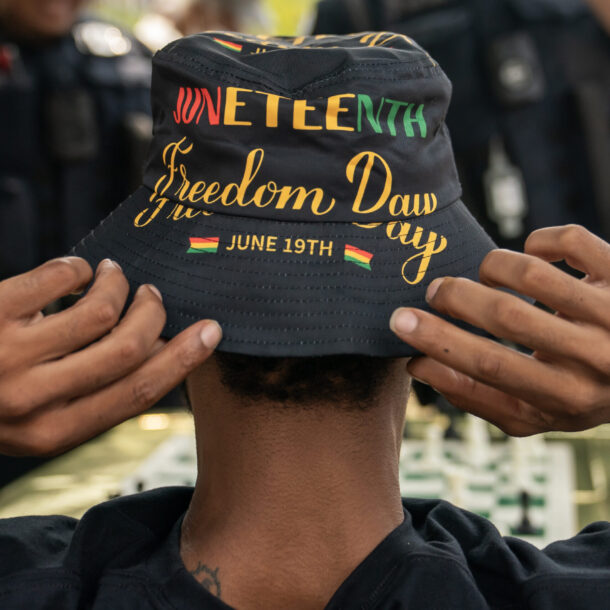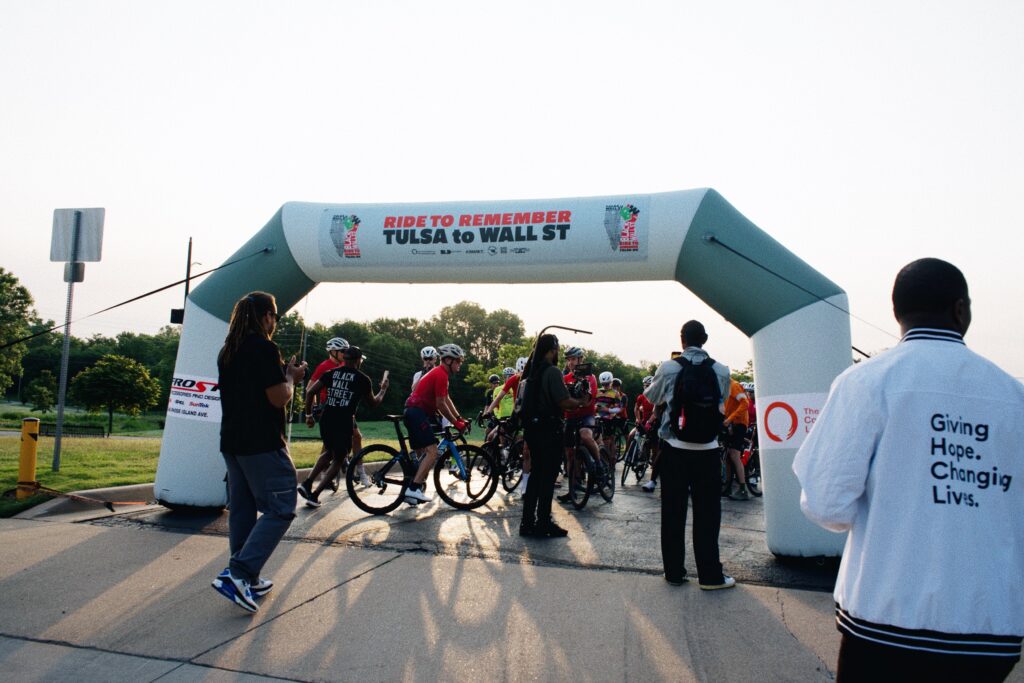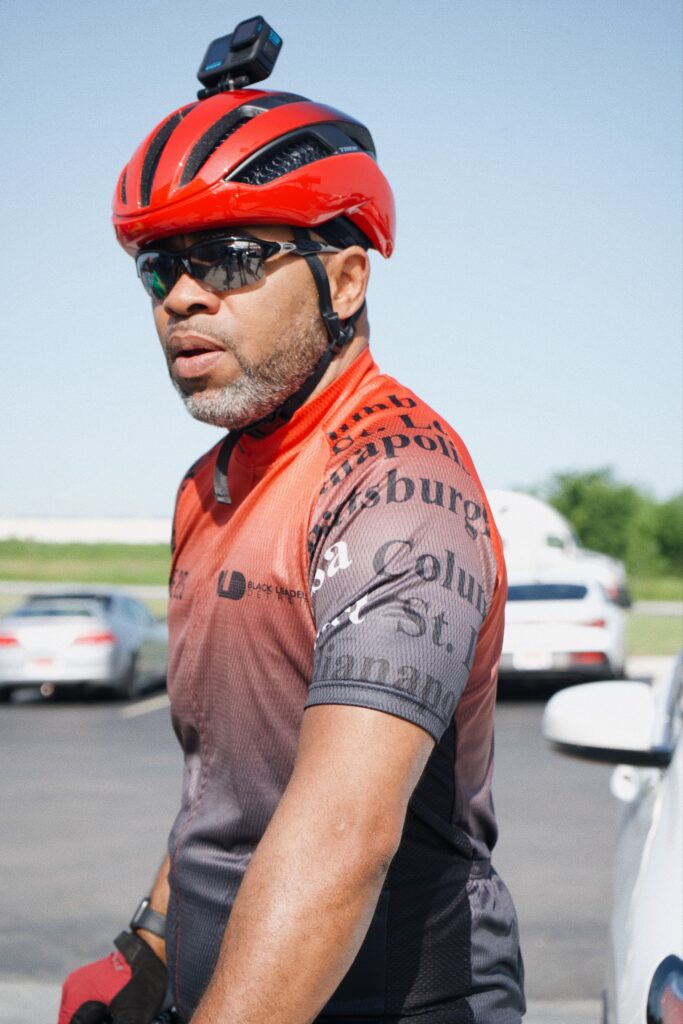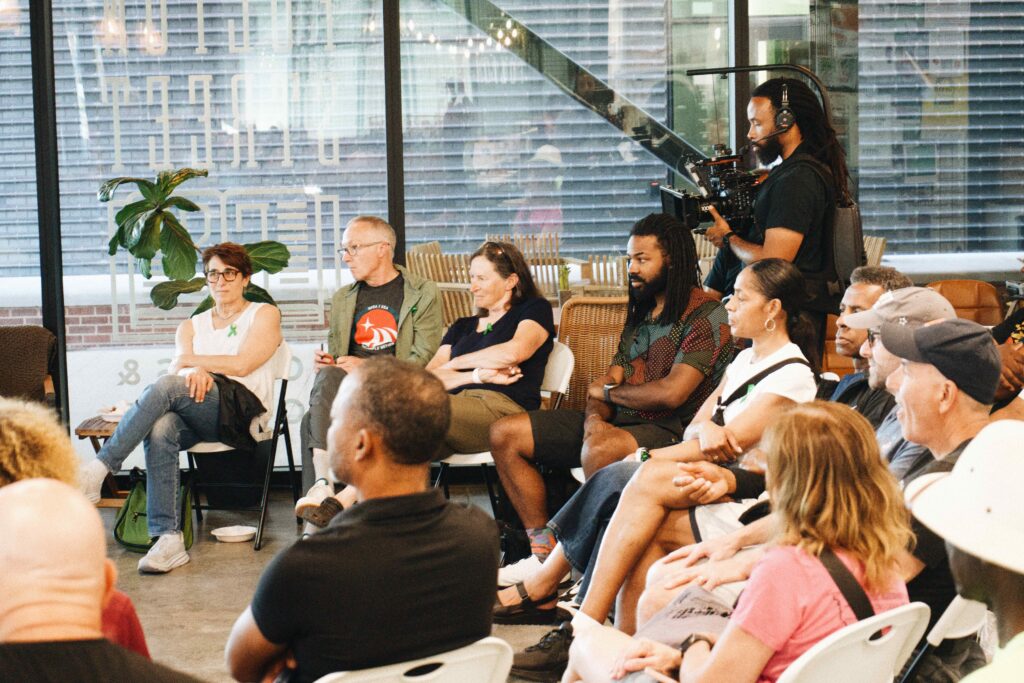
Stay
UpdateD
Join the BPC
Email List
Stay up to date on exciting projects and upcoming events from the Black Promoters Collective.
According to a 2022 data report from the U.S. Census, there were nearly 195,000 Black businesses in America. It’s no secret that Black business owners face hardships related to capital and sustainability, unlike any other demographic. One organization is working to change that: Black Leaders Detroit.
The organization is membership-based, with 5,000-6,000 members who donate $1 a week, or $52 a year, that goes into a large fund in which loans are distributed to Black businesses. Since its inception, BLD has distributed more than $4.5 million in loans. One of its fundraising initiatives is an annual cycling journey, typically throughout the state of Michigan.
In honor of its fifth anniversary, cyclers are journeying from Tulsa, Oklahoma, to New York City, on a 31-day journey called the Ride for Equity. Along the way, they’re stopping in cities where loans are needed for Black business owners to develop partnerships and distribute funds and education.

Founder and CEO Dwan Dandridge told Blavity that he turned to cycling when he had to give up basketball due to having a heart condition that required him to get a pacemaker.
“I never intended to cycle like this. When I started cycling, it was just to stay fit,” Dandridge said. “But the first year we did the bike ride from Detroit to Mackinac Island in Michigan, the first Ride for Equity was the first year that I ever trained to ride at these types of distances. And the rest is history.”

On the stop in St. Louis, BLD learned just how hard Black business owners there have it. According to a financial consultant who has worked in over 200 U.S. cities, no other city has a smaller community development financial institution network that operates as a nonprofit bank in underserved communities. There’s a debt capital void in St. Louis that has created the highest per capita number of predatory lenders. The consultant asked how BLD’s model works against such.
Chief operating officer Sharea Ayers explained how BLD’s application process combats the disparities Black business owners face. The first step is to remove unnecessary financial requirements that most loan applicants expect. In the application process, there’s a funding board that consists of Detroit residents, some of whom are business owners themselves. Some of them run nonprofits that support businesses from the technical assistance side. They make decisions on any of the loans valued at $10,000 or more and walk business owners through the application process.
BLD has a loan officer who helps applicants and ensures the paperwork and other requirements are submitted and met. Once they make it past that point, if the candidate appears valuable, they present their plan in front of BLD’s funding board. The funding board meets with a committee of two of those members, holds an interview with the applicant with BLD’s loan officer, and makes a recommendation regarding approval.
In terms of what BLD is looking for in its candidates, the starting point is for the company to be majority-owned by someone of African descent who has been in business for at least a year and operating in the city of Detroit. As long as they’re proving they’re making money and in a position to be able to pay back the loan on a monthly basis, the business owner’s financials are examined. Unlike most loans, which require two co-signers, BLD doesn’t. The applicant can bring a co-signer or collateral, or receivables.
While in St. Louis, BLD announced that any small business that was Black-owned and fit its criteria, with someone from the company who attended the special discussion, would receive $500 toward their business.
One of their donors and supporters participating in the 31-day journey, an artist named Marcus Lyon from the British countryside who serves on BLD’s ally council, expressed his admiration for BLD and why he donates his time and money to the organization.
He’s known Dandridge since 2016, while he was working in Detroit on a project for the city in which they were colleagues.
“When he set up Black Leaders Detroit, he rang me up, and he said, ‘Marcus, you’ve done governance and strategic guidance work for NGOs, nonprofits, for over 30 years. Would you consider being on my ally council?’ And I said, ‘I would be honored to serve you and to serve the work, the mission you have to give access to capital to Black entrepreneurs in the city of Detroit.’”
As a man who comes from humble but privileged beginnings and a family that is committed to community, BLD’s mission resonated with Lyon.
“I’ve been lucky enough to be around many, many people in my life, right from the origin story, but right through my adult life, being around people who were trying to give back and make change,” Lyon told Blavity. “So I pretty much made it my business to be around those people, to choose those people as the people I wanna be with.”

Of his affinity for Detroit, he said, “I think I got a really good name in Detroit because I think a lot of white people come into Detroit, and they kind of already decided what the story is that they’re going to tell. And then they go and look for the things that back up the story they want to tell, whereas actually I went there, and I did a narrative piece of kind of, uh, art documentary work, which based the story I told on the voices of the people who live and work in Detroit. So the connection with the city and the people that were doing that work was so deep. So I always wanted to give back. I’ll be trying to do interesting things with people in Detroit for the rest of my life.”
Once the loan proceeds are distributed, many recipients wonder what’s next. Of course, there’s fear from recipients about how to manage the loan, but BLD doesn’t provide financial education. Instead, they outsource.
“We don’t do technical assistance. We have partners that take that on, so we don’t believe in meeting all the needs of entrepreneurs,” Dandridge explained. “We believe in doing what we do. We know that there are entrepreneurs that need other things like technical assistance. We know all of them need money. So we feel like if we can get that, and somebody else can get other things, then we’ll let them do that. So we’re not spreading so thin, we’re not stepping into a space where we really don’t belong.”
Stay up to date on exciting projects and upcoming events from the Black Promoters Collective.

©2025 Black Promoters Collective (BPC) All Rights Reserved.